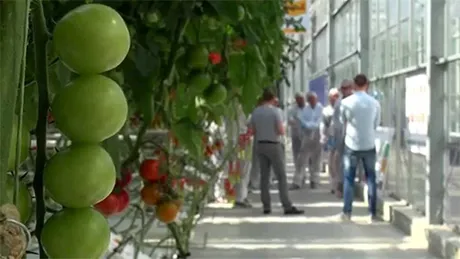According to John Willems of Bayer's vegetable seeds division in the Benelux, much is still unknown. "When receiving the required regulatory approval, it will take until late 2017 for the Bayer-Monsanto combination to become a reality."

Nunhems tomato crop
Not much overlap of activities
Looking at the whole Bayer-Monsanto deal, vegetable seeds only make up a small part. Bayer's and Monsanto's agricultural entities with row crops and crop protection products are a much bigger deal.High tech greenhouse vegetable seeds account for just a few percent of the entire turnover of both companies. Yet, greenhouse horticulture is an important growth market.
Bayer has the goal to become a key breeder of high tech greenhouse vegetable varieties and has been increasing their investments in this field for years. This takeover fits into that picture, according to Willems, who says Monsanto have been investing in this sector as well.
In high tech vegetables, Willems sees Bayer and Monsanto mostly as complementary, without much overlap of activities.
Renowned varieties
Looking at the three biggest greenhouse crops (cucumber, bell pepper and tomatoes) both Bayer and Monsanto are very active in tomato breeding. "But we need to be modest in this aspect. Bayer is a relatively new player with a limited market share in greenhouse tomatoes, but we do want to advance in that field."The portfolio of De Ruiter has given Monsanto a leading position in regards to high yielding tomato varieties that account for a large market share in the global high tech greenhouse vegetable market.
Bayer is a bigger player with its high tech cucumber varieties, with Monsanto having announced a comeback recently.
In peppers, Bayer isn't active at all, while Monsanto again has much important material available via its breeding activities at DeRuiter. And Monsanto of course has some of the most renowned rootstock material available for greenhouse cultivation.
Without any doubt, the combination of all this genetic material can result in a very interesting greenhouse vegetable portfolio for Bayer-Monsanto.
Image
Bayer is also very active with their crop protection for greenhouse horticulture, which they operate as a separate entity aside of their seed business.But it was exactly the 'synergy' between Monsanto's crop protection and their seed business that caused some controversy over time.
For the high-tech greenhouse vegetable seeds, this is not an issue, Willems says. "Not just because genetic modification of crops simply doesn't occur in this industry, but also because we will not combine these two disciplines in the future."
Monsanto's image is a topic for Bayer, however. "Image is important for any company. We will have to see how to deal with that - but it will take years for a decision to be reached on that. For the future, the merger will offer opportunities to develop new products and services for the market that hadn't been possible until now."
